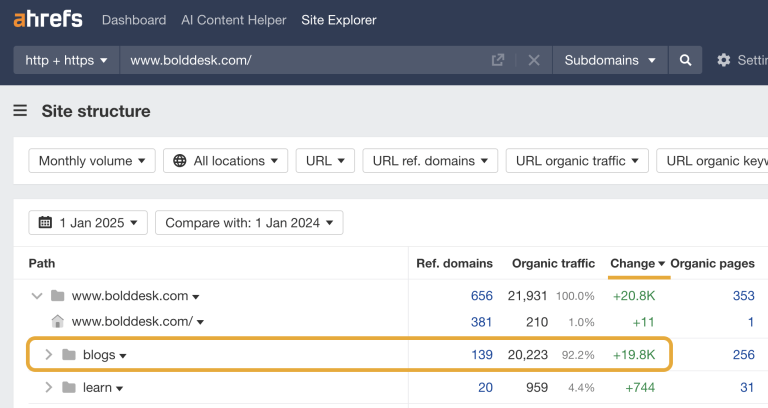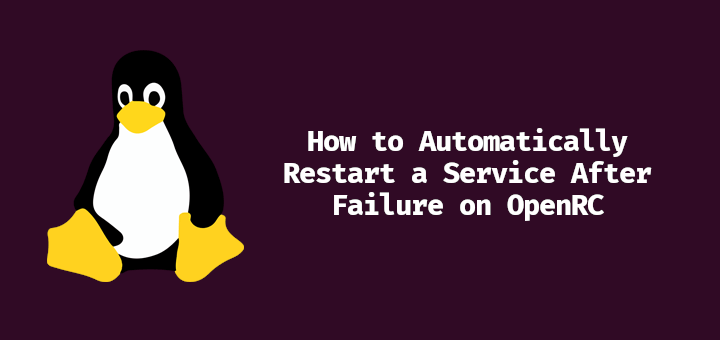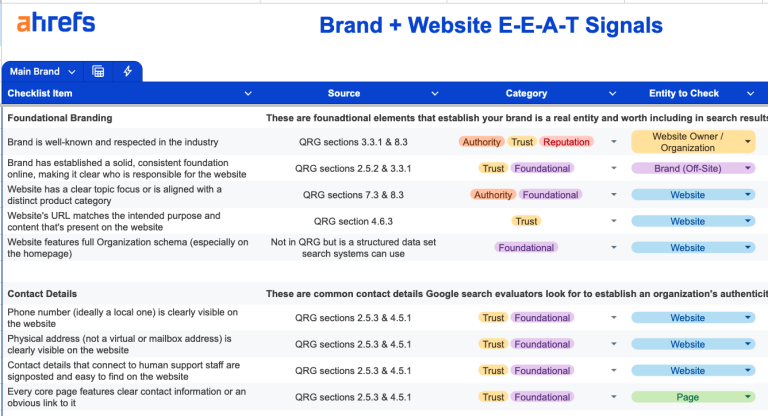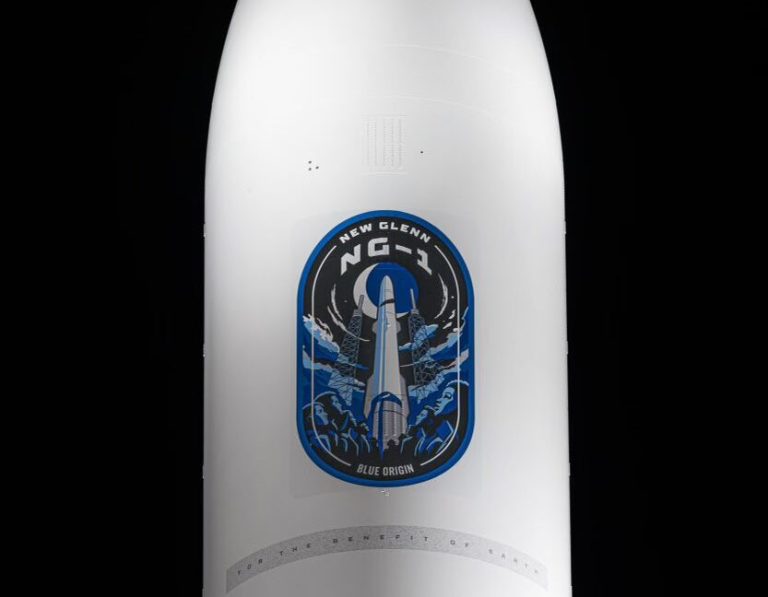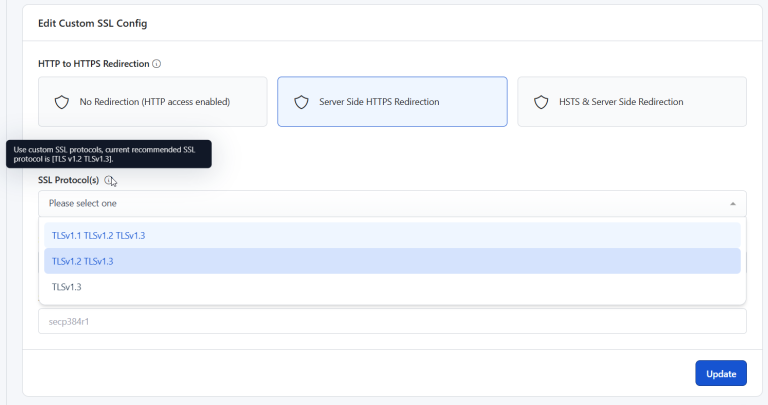Ever wondered how to make managing multiple WordPress websites easy – whether that involves a handful of sites or many hundreds? You’ve come to the right place.
The answer is simple, and two-fold:
- Use a solution such as RunCloud, which makes it extremely easy to deploy and manage your production-grade cloud infrastructure across cloud providers of your choice, all from a single, centralized dashboard.
- Pair your industry-leading hosting setup with a WordPress management tool.
In this post, we’ll focus on #2. After all, if you’re reading this post on the RunCloud blog, you already know why RunCloud is the leading way to build your cloud infrastructure.
Although managing WordPress websites is becoming significantly easier with the introduction of automatic updates as a part of WordPress core, if you manage multiple websites (even just a couple), the benefits of using a proper WordPress management solution will become clear as you begin to adopt it as a part of your workflow.
Consider a typical scenario: a web development agency managing 20 client websites, each requiring weekly updates, security checks, and regular backups. Without a management tool, this could consume up to 20 hours per week of manual work – logging in to each site individually, checking for updates, running backups, and monitoring security.
A WordPress management tool can accomplish these same tasks in under an hour by automating processes and allowing you to perform actions in bulk on multiple sites.
This dramatic time saving directly translates to improved profitability and the ability to scale operations without being forced to proportionally increase your company headcount.
And this is just the beginning.
The benefits of WordPress management tools extend far beyond simple time savings.
Take, for example, the critical aspect of security monitoring. When a major vulnerability is discovered in a popular plugin, time is of the essence. A management tool can identify all affected sites instantly and apply updates across the entire portfolio within minutes – a process that could take hours or even days if done manually.
In short: the ROI of WordPress management tools cannot be understated. By combining automation, a better workflow, security, and everything else a good WordPress management solution offers, you can streamline your operation to maintain the sites under your management with less time and fewer people on your team.
You might wonder why you should use a WordPress management service when WordPress already has built-in multisite network functionality. It’s easy to confuse them since WordPress does allow you to manage multiple sites, but there is one key distinction.
The multisite network only allows you to manage sub-sites of a single WordPress installation. This means that you can’t use it to manage the websites of different clients, as all the websites in a multisite network belong to a single organization. On the other hand, a WordPress management tool has no such restrictions and can be used with any WordPress site.
Let’s take a look at some of the best WordPress management tools.
Table of Contents
- 0.1 1. MainWP
- 0.2 2. InfiniteWP
- 0.3 3. ManageWP
- 0.4 4. WP Umbrella
- 0.5 5. WP Remote
- 0.6 6. Solid Central
- 0.7 7. Glow
- 0.8 8. iControlWP
- 0.9 9. WP Central
- 0.10 10. Modular DS
- 1 After Action Report – Choosing The Best WordPress Management Software For Your Business
- 2 Frequently Asked Questions About WordPress Multi-Site Management
- 2.1 How do I keep track of plugin updates across all my WordPress sites?
- 2.2 What happens if one of my clients’ websites gets hacked or crashes?
- 2.3 How can I manage different client logins and passwords securely?
- 2.4 How do I prove to my clients that I’m actively maintaining their websites?
- 2.5 What if I need to install the same plugin across multiple websites?
- 2.6 How can I manage WordPress core updates without breaking my clients’ sites?
- 2.7 What’s the best way to monitor the performance of multiple WordPress sites?
- 2.8 What if my team needs to collaborate on managing multiple WordPress sites?
1. MainWP
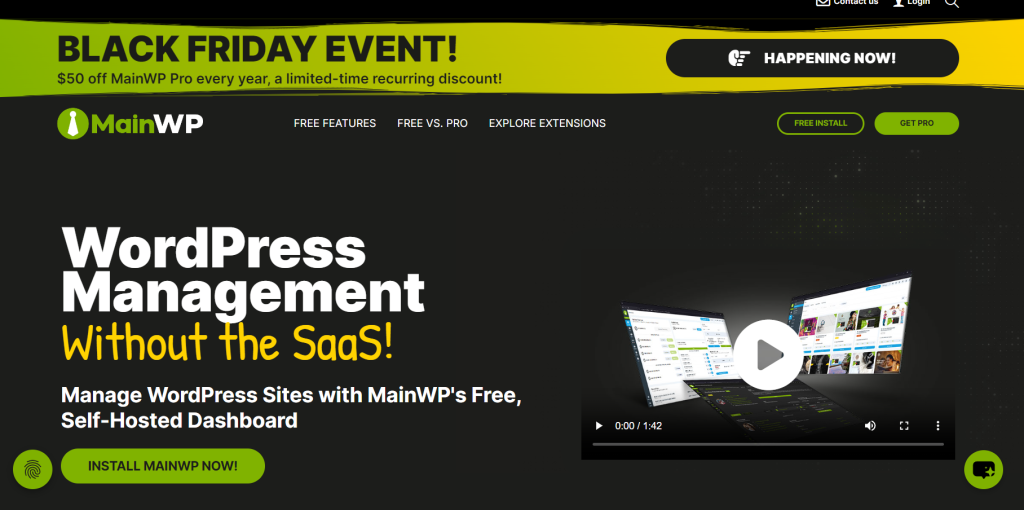
MainWP is a self-hosted WordPress management solution that allows administrators to handle multiple WordPress sites. It offers a centralized dashboard where users can efficiently manage unlimited WordPress installations, making it invaluable for agencies, developers, and site managers.
It also has a comprehensive update management system that allows users to update WordPress cores, themes, and plugins across all sites with a single click. What sets MainWP apart is its robust security features, including automated security checks, abandoned update notifications, and proactive monitoring – all while maintaining complete data ownership since it’s self-hosted.
The pricing structure is particularly attractive. It offers a feature-rich free version and a Pro version starting at $199 yearly or a one-time payment of $599 for lifetime access, making it a cost-effective solution regardless of how many sites you manage.
While the initial setup and configuration process may require some time investment, the long-term benefits in efficiency and control are substantial. Users can benefit from features such as scheduled automated updates, security scanning, uptime monitoring, and client report generation. It also includes valuable capabilities such as staging site creation, content cloning between sites, and maintenance mode management.
2. InfiniteWP
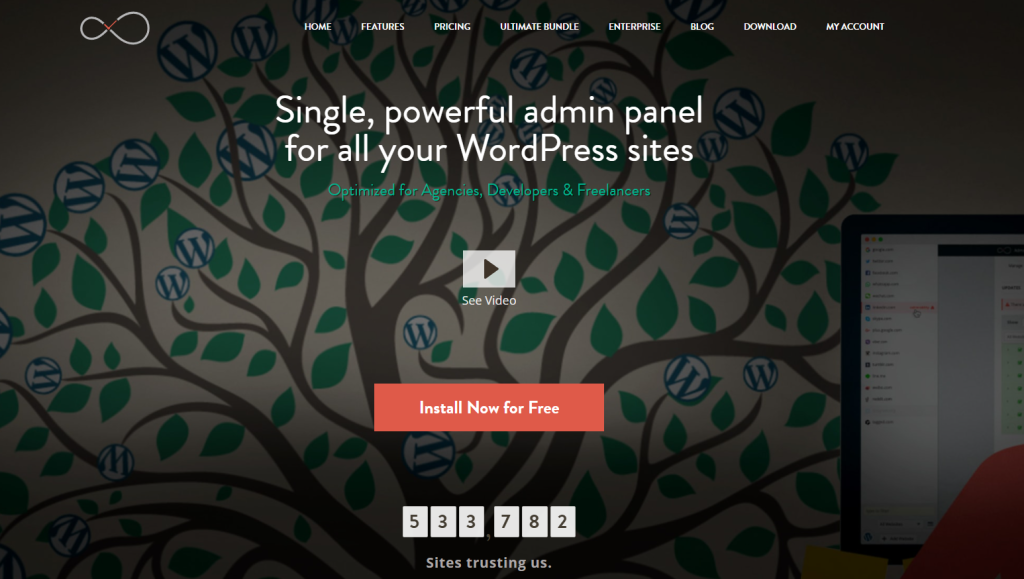
InfiniteWP is a powerful WordPress management solution that efficiently changes how administrators handle multiple WordPress sites. It offers a robust free version with essential features such as 1-click admin access, updates, and backup/restore capabilities.
It provides multiple subscription options, ranging from the Starter plan ($147/year for ten sites) to the Enterprise level ($647/year for unlimited sites). It includes essential tools such as malware scanning, uptime monitoring, Google Analytics integration, and client reporting capabilities, which makes it particularly valuable for freelancers and agencies.
Users can perform bulk actions such as managing users, handling WordPress maintenance, monitoring WordFence security, and simultaneously publishing content across multiple sites.
It also offers some site monitoring features such as plugin branding, broken link checking, Google PageSpeed monitoring, and integration with various security tools, including iThemes Security and Duo Security 2-Factor Authentication.
3. ManageWP
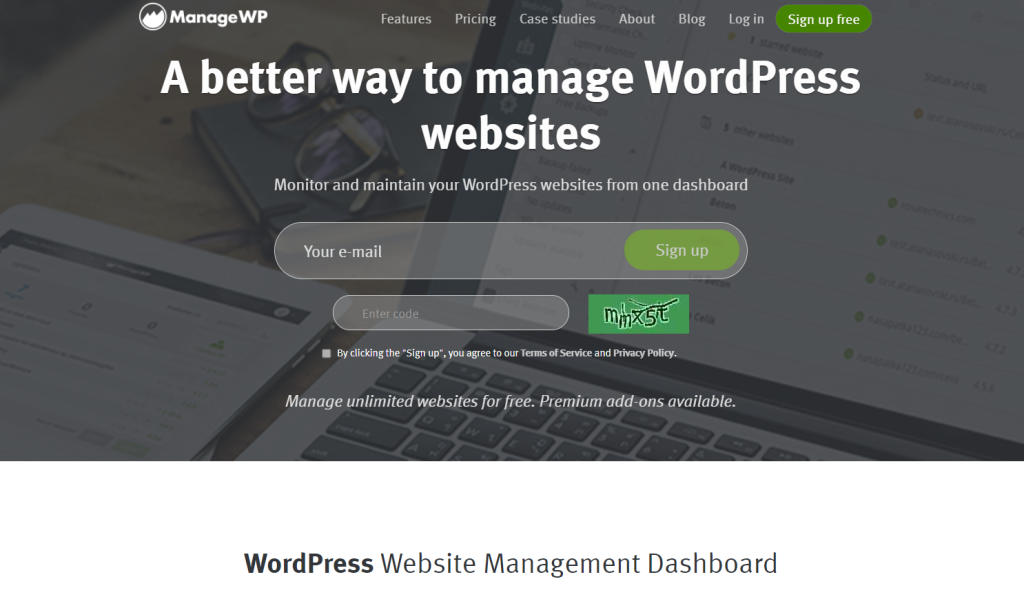
ManageWP is a versatile WordPress management solution that offers tools for managing multiple WordPress websites from a single dashboard. Its free tier includes essential features such as plugin and theme update management, monthly cloud backup, one-click login functionality, and basic security and performance checks.
What makes ManageWP particularly appealing is its flexible pricing structure, allowing users to start with unlimited websites at no cost and gradually add premium features as needed. ManageWP’s core functionality includes collaboration tools, analytics integration, comment management, code snippet implementation, maintenance mode controls, and vulnerability updates, making it suitable for freelancers, agencies, and WordPress professionals managing multiple sites.
You can purchase premium add-ons to enhance its capabilities with specialized features priced on a per-website basis at $1-$2 monthly. These premium features include advanced backup solutions, white-label options for agencies, SEO ranking tools, uptime monitoring, automated security and performance checks, and link monitoring.
ManageWP employs a transparent pricing model. Users only pay for the add-ons they actually use, with payments processed at the beginning of the following month. For larger agencies managing over 25 websites, bundle options provide fixed monthly fees for up to 100 websites.
4. WP Umbrella
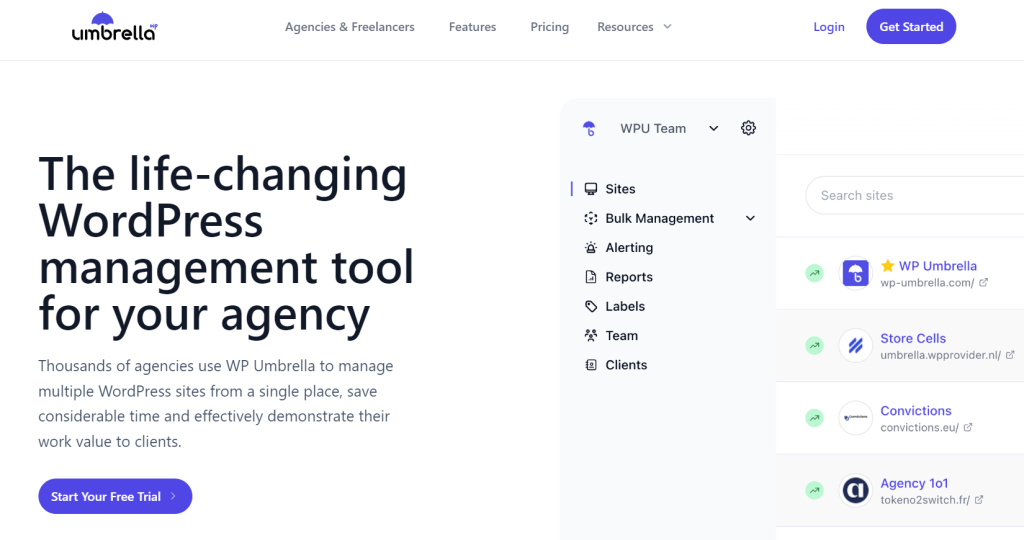
WP Umbrella is a relatively new and affordable WordPress management solution that offers a comprehensive suite of features at a transparent price point of $1.99 per site per month. It provides essential tools for WordPress maintenance businesses without the complexity of tiered pricing or feature restrictions.
You can use it to manage and maintain critical aspects of WordPress. For example, it includes a centralized dashboard for monitoring multiple sites, secure bulk updates for WordPress core, plugins, and themes, and robust security features, including vulnerability monitoring and automatic cloud backups.
Like many other management tools, it offers uptime tracking, Google PageSpeed analysis, and PHP error detection. Its integration capabilities with services such as Slack and Google Analytics make it useful for professional users.
WP Umbrella’s focus on automation and client management features makes it particularly effective for agencies and freelancers. It provides the functionality to produce maintenance reports, one-click access to all managed sites, and a complete white-label solution that allows agencies to maintain their branding.
5. WP Remote
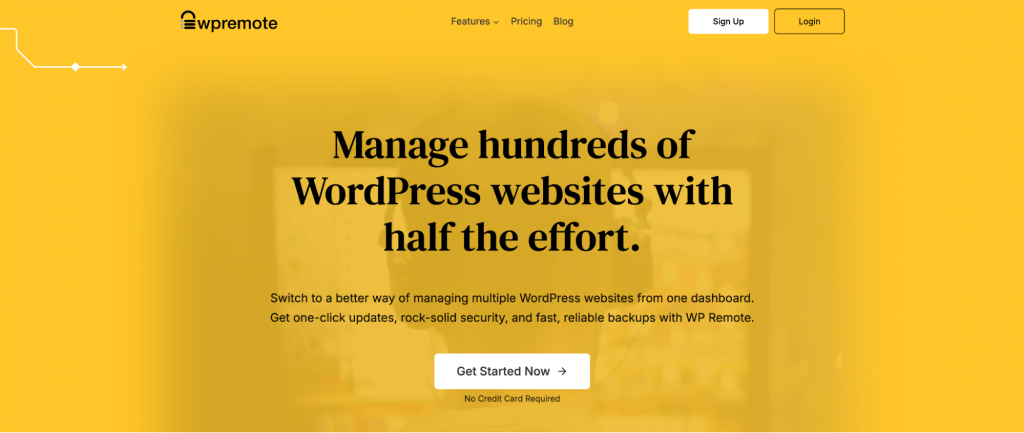
WP Remote offers a WordPress management solution that can streamline the management process of multiple WordPress websites through a unified platform. It offers three distinct plans (Basic at $29, Plus at $49, and Pro at $99 – all monthly for up to five sites) that cater to different management needs.
WP Remote excels in providing essential management tools, including daily automatic backups, single sign-on capabilities, uptime monitoring, performance checks, and automated updates across all managed sites. Additionally, it combines the functionality of multiple WordPress plugins, making it a one-stop solution. For example, it offers security features such as malware scanning and real-time firewall protection with practical maintenance tools, including visual regression testing and white-label reporting options.
You can take advantage of its customizable add-on system, which allows users to tailor their management capabilities to specific needs. These add-ons include real-time backups ($10/site/month), more frequent backup and security scans (from $5/site/month for 12-hour intervals), and additional staging sites ($10/site/month).
Larger agencies and advanced users can sign up for its custom enterprise subscription, which provides API access. Additionally, its comprehensive approach to website management is complemented by its focus on security and reliability, as it offers features like bot protection, vulnerability scans, and activity logs in higher-tier plans.
6. Solid Central
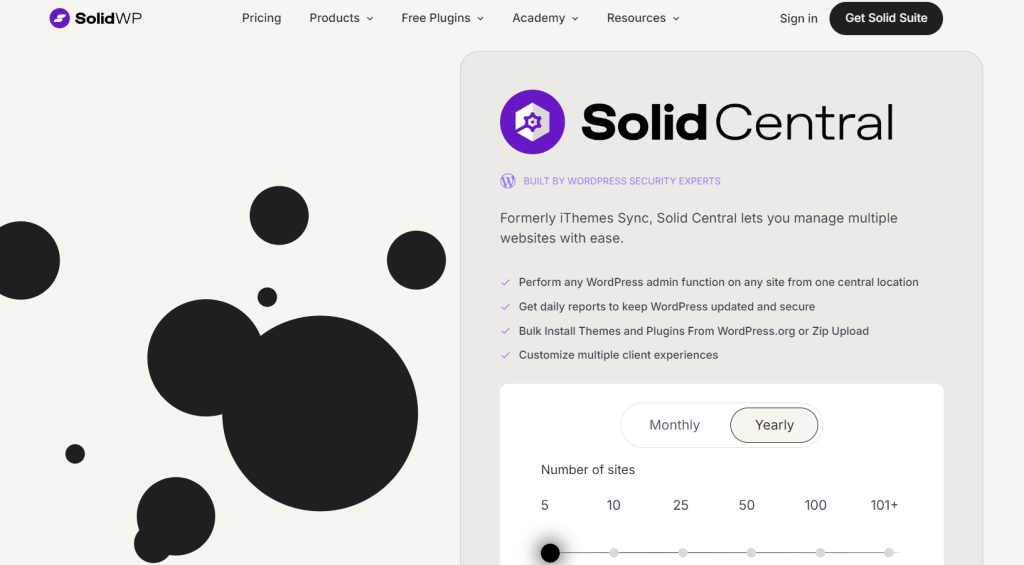
Solid Central (formerly iThemes Sync) is one of the most popular WordPress multi-site management solutions that can easily handle 100+ websites from a single, centralized dashboard. Rather than logging in to multiple WordPress installations individually, administrators can perform critical tasks across all their sites simultaneously, including bulk updates, plugin installations, and security monitoring.
It offers reporting capabilities that help maintain transparency with clients by generating insights and updates about site performance, security status, and maintenance activities. It also offers essential features such as uptime monitoring, performance tracking, and detailed activity timelines that provide real-time visibility into site operations and potential issues.
If you are part of the broader SolidWP ecosystem, you will appreciate the way Solid Central integrates with other powerful tools, such as Solid Security and Solid Backups, to provide a complete website management solution. This integration enables users to monitor security threats, manage backups, and restore sites remotely, all from the same interface.
7. Glow
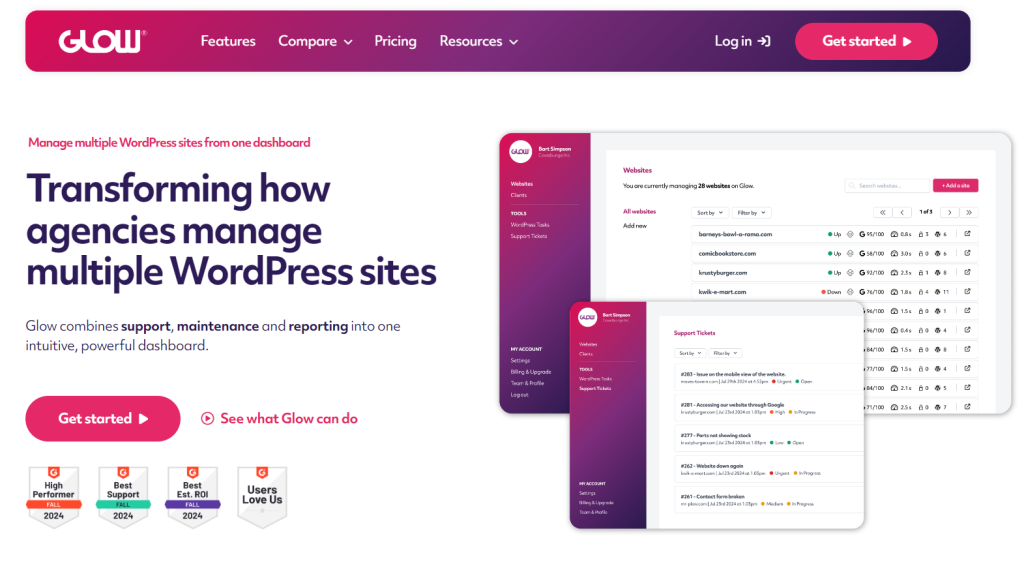
Glow is a lesser-known WordPress management solution launched in 2020. It allows agencies and developers to efficiently manage 20-100+ WordPress websites and offers critical features such as plugin management, automated backups, and performance monitoring.
Glow’s integrated support ticket system and time-tracking capabilities set it apart. These enable teams to manage client communications and track work hours directly within the same interface they use for website maintenance. Glow also offers a special two-way core update functionality that allows users to either manually update WordPress sites from their WordPress admin dashboard, or update them all at once.
If you are working with a team, you will enjoy its collaboration and client reporting tools. Glow offers customizable and automated client reports that display time spent on activities, unlimited client team members, and the ability to run the dashboard under an agency’s own branding.
Glow offers a flexible pricing structure, including pay-as-you-go options for additional websites, making it accessible to agencies of all sizes. This makes it a great tool for both hobbyists and professionals.
8. iControlWP
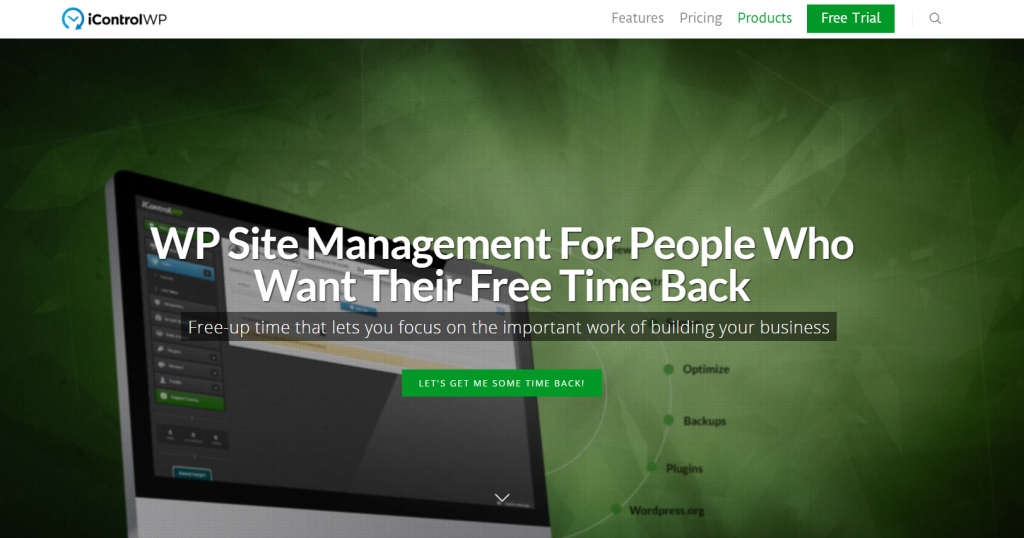
iControlWP is a powerful tool for managing multiple WordPress websites. It allows users to streamline various essential tasks, saving time and effort. It provides a centralized dashboard for complete visibility and control over all your WordPress sites, eliminating the need for individual logins.
You can use it to manage plugins and theme updates across your network, ensuring consistent functionality and security. Additionally, you can proactively safeguard your sites with integrated vulnerability scanning and malware detection, and be assured your data is secure with automatic daily backups stored off-site.
iControlWP goes beyond traditional multi-site management tools, offering advanced features such as:
- Database Cleanup and Optimization: Maintain optimal website performance by cleaning up and optimizing databases across your network.
- Mobile Push Notifications: Receive instant alerts on critical updates, security threats, and site performance issues directly to your mobile device.
- Bulk Management: Perform actions across multiple sites simultaneously, such as updating plugins or resetting passwords, saving you valuable time.
If you run an agency, you can generate professional reports for your clients showcasing website performance metrics and activity, and customize the platform with your branding for a seamless white-labeled client experience.
9. WP Central
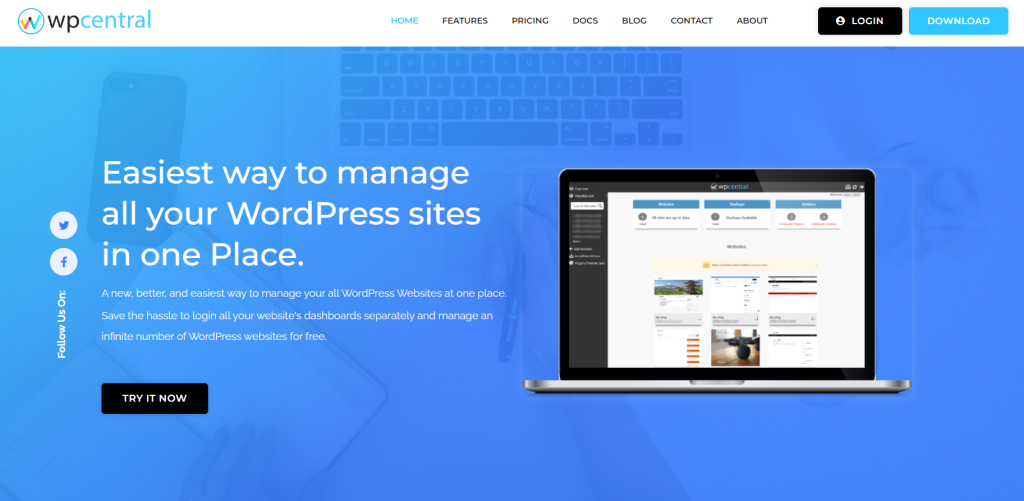
WPCentral is a powerful tool designed to simplify the management of multiple WordPress websites. WPCentral provides a centralized dashboard where you can oversee all your sites from one location. This means that you don’t need to individually log in to each one of your WordPress websites to manage plugins and themes.
You can easily use it to perform local and remote backups and even create pre-configured plugins and themes to apply to new sites. It offers a user-friendly interface and intuitive design, making maintaining consistent functionality and security across your WordPress portfolio much easier.
WPCentral offers various pricing plans to suit different needs, from a free plan perfect for beginners to a corporate plan for businesses with a large number of sites. The free plan offers essential features, including plugin and theme management, local backups, remote backups, plugin sets, theme sets, and automated backups. Each paid plan offers increased website limits, making it ideal for agencies, freelancers, and businesses managing multiple websites.
10. Modular DS
Modular DS is a comprehensive WordPress management solution that streamlines the complex task of maintaining multiple WordPress websites. Its intuitive approach to automation and maintenance makes life easier for developers by combining essential features such as automated backups, bulk updates, and uptime monitoring into a single, user-friendly dashboard.
This tool effectively transforms hours of repetitive maintenance tasks for agencies and WordPress professionals managing multiple sites into simple one-click operations.
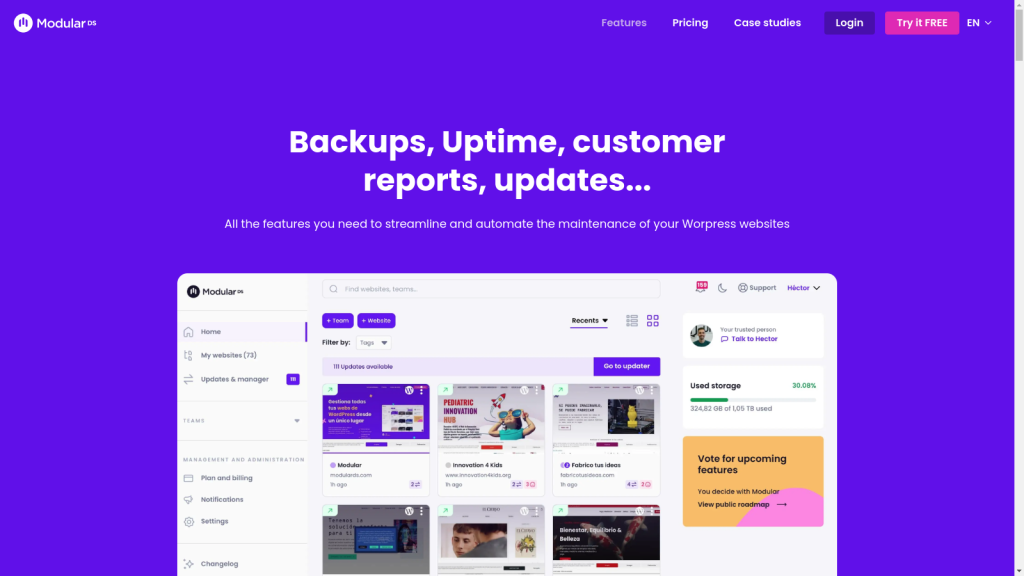
The bulk management capabilities are particularly handy when you simultaneously update plugins, themes, and WordPress core across multiple sites. What’s especially noteworthy is Modular DS’s holistic approach to website health monitoring, which actively scans for potential issues such as outdated PHP versions, deactivated plugins, and server configuration problems, enabling proactive maintenance rather than reactive problem-solving.
Perhaps one of Modular DS’s most valuable aspects is its client reporting system. The platform automatically generates professional reports that showcase the maintenance work performed, including uptime statistics, Google Analytics integration, and Core Web Vitals performance metrics. This feature helps justify the value of maintenance services to clients and streamlines client communication through automated report delivery.
After Action Report – Choosing The Best WordPress Management Software For Your Business
In this article we have covered a number of excellent tools designed to let you manage multiple WordPress sites in a single place. These ten WordPress management tools are available for all user levels and needs.
Many tools offer a free basic plan for managing your sites. Professional users can buy selected add-ons or subscribe to a paid plan for all advanced features.
If you’re looking for a simple, hosted solution that’s easy to get up and running, we’d recommend looking into ManageWP and WP Umbrella. ManageWP has a generous free tier, and WP Umbrella, as a newer solution, has an incredibly motivated team that actively ships improvements to the product every month (the same, sadly, cannot be said about ManageWP).
If you’d prefer self-hosted WordPress management tools, MainWP is the most affordable tool (nothing beats free). It offers additional features via extensions, supports many popular WordPress plugins, and has good community support.
Which WordPress management tool are you using now, and how many sites do you manage? Let us know & join the conversation by Tweeting @RunCloud! 💬
Now that we’ve narrowed down the list of WordPress management tools to consider for your business – we’d love to help you make the second component of managing WordPress websites the best it can possibly be for your business:
Looking to build your own production-grade infrastructure? Try RunCloud.
- Pick your cloud provider: Deploy directly to your AWS, GCP, Vultr, UpCloud, and Hetzner platform all directly from your RunCloud dashboard.
- Easy Cloudflare DNS Integration: Manage your DNS records directly in your RunCloud dashboard and automatically connect domains when spinning up your new web applications.
- One-Click Staging Environments: Spin up staging environments directly from your dashboard in just a few clicks.
- Redis Object Caching: Easily enable Redis object caching for as many sites on your server as you’d like (secure by design using Redis ACLs, which have not been properly implemented by the majority of other hosting providers).
Frequently Asked Questions About WordPress Multi-Site Management
How do I keep track of plugin updates across all my WordPress sites?
Managing updates across multiple WordPress sites can be time-consuming and overwhelming. Logging in to each site individually to check for updates is inefficient and risks missing critical security updates. WordPress management tools can easily update and manage multiple WordPress sites.
What happens if one of my clients’ websites gets hacked or crashes?
Without a proper backup system, a hacked or crashed website can mean hours or days of lost work and potential loss of business for your clients. Regular automated backups help in quick recovery and give peace of mind.
How can I manage different client logins and passwords securely?
Keeping track of multiple WordPress admin credentials for different sites can be a security risk, especially when written down or stored in unsecured documents. Many WordPress management tools have a centralized dashboard with secure single-sign-on capabilities, eliminating this risk.
How do I prove to my clients that I’m actively maintaining their websites?
Many WordPress professionals struggle to demonstrate the value of their maintenance work to clients. Automated reporting systems that track updates, security measures, and performance metrics can help justify your services.
What if I need to install the same plugin across multiple websites?
Manually installing and configuring the same plugins across multiple WordPress sites is repetitive and time-consuming. WordPress management tools offer bulk installation and configuration functionality, saving work hours and ensuring consistency.
How can I manage WordPress core updates without breaking my clients’ sites?
WordPress core updates can sometimes cause compatibility issues with themes and plugins. Modern WordPress Management tools allow testing updates and offer quick rollbacks, which helps maintain site stability.
What’s the best way to monitor the performance of multiple WordPress sites?
Tracking performance metrics such as page speed and Core Web Vitals across multiple sites can be challenging when done manually. WordPress management tools offer an integrated performance monitoring system that helps identify and address issues before they impact user experience.
What if my team needs to collaborate on managing multiple WordPress sites?
Managing access levels and coordinating maintenance tasks among team members can be complex. WordPress management tools provide a centralized dashboard with team permissions, and activity logging helps maintain security and accountability.
